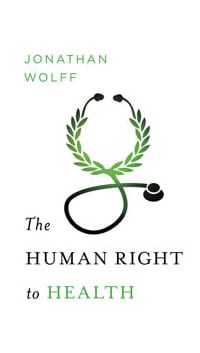The Human Right to Health
By news editor, on 3 April 2012
 The latest book in the Amnesty International Global Ethics Series, published by Norton is The Human Right to Health, written by Professor Jonathan Wolff (UCL Philosophy).
The latest book in the Amnesty International Global Ethics Series, published by Norton is The Human Right to Health, written by Professor Jonathan Wolff (UCL Philosophy).
On Tuesday 27 March, Amnesty International hosted a panel discussion to launch this new publication. The panel consisted of Jonathan Wolff, Mike Rowson (UCL Centre for International Health and Development) and Widney Brown (Amnesty International), and was chaired by Steve Crawshaw (Amnesty International).
Panel Discussion
Professor Wolff began by admitting that because of his philosophical roots he was a relatively recent convert to the concept of the human right to health. Despite this, his book defends the concept against multiple criticisms.
The first criticism to be discussed relates to the phrasing of “the right to the highest attainable standard of health” (United Nations).
Three routes of criticism seem to emanate from this statement, firstly, how is attainability measured – globally, nationally or regionally could give very different standards. Secondly, this seems an unreal expectation and thirdly, if this right exists – who is accountable for providing it.
A further point raised was the fact that health itself did not need to be a human right – it could be considered simply a culmination of other human rights.
Professor Wolff used the interesting case study of HIV in order to illustrate a paradox relating to the right to health. He explained that in the 1980s in the West, a civil rights movement was sparked by the spread of HIV, which aimed to reduce the stigma and discrimination. The new (and expensive) treatments that were introduced later began a debate about the right to treatment.
The reverse is currently true in Africa, where it is arguably much easier to obtain treatment for HIV than to reduce the stigma and discrimination surrounding it. Rendering an argument about the right to treatment unnecessary, but highlighting the importance of a civil rights movement.
Widney Brown highlighted her point of view by posing the question – how can something that is listed as of utmost importance when people are asked what they are most grateful for, be extraneous? Especially when it can have such a large impact on everything else.
She went on to explain that a major challenge is keeping the ‘human’ in ‘human rights’ and commented that whereas in the past the focus has been on access to treatment, it is now moving towards working to enable health.
Mike Rowson raised the difficult issue of internationalising a right – discussing the possible negative national impact of having to follow international guidelines, particularly in resource-constrained countries. He mentioned that a practical step would be strengthening claims to healthcare, but noted that the quality of care that people receive may vary greatly.
Continuing, Mike Rowson expressed the opinion that when considering the human right to health it is important to consider social, cultural, legal, philosophical and medical issues.
Engaging debate
Following an insightful introduction from each of the three speakers on the panel, the floor was opened for comments and questions, and a lively debate ensued.
The highlights of the discussion were some of the more complex and thought-provoking issues raised:
• Is there a right to health?
• If there is a right, is it to health, or to healthcare?
• Can the right to health be seen as a culmination of other rights?
• Should the right to health be based on the right to treatment or the right to prevention, or both?
• If there is a right to health, who is accountable?
• Should the right to health be utilised on an individual rights basis or is it better utilised as a group right?
For example, should it be used in court for an individual to fight for an expensive treatment?
• What about mental health?
This was unfortunately one of the final points raised, which meant it couldn’t be discussed in more depth – but nevertheless it highlighted an important yet marginalised issue.
Furthermore, it is an issue that could potentially bring different arguments to the situation, especially with regard to the question about the right to health versus healthcare.
Jessica Lowrie is an intern in UCL Communications & Marketing.
 Close
Close

